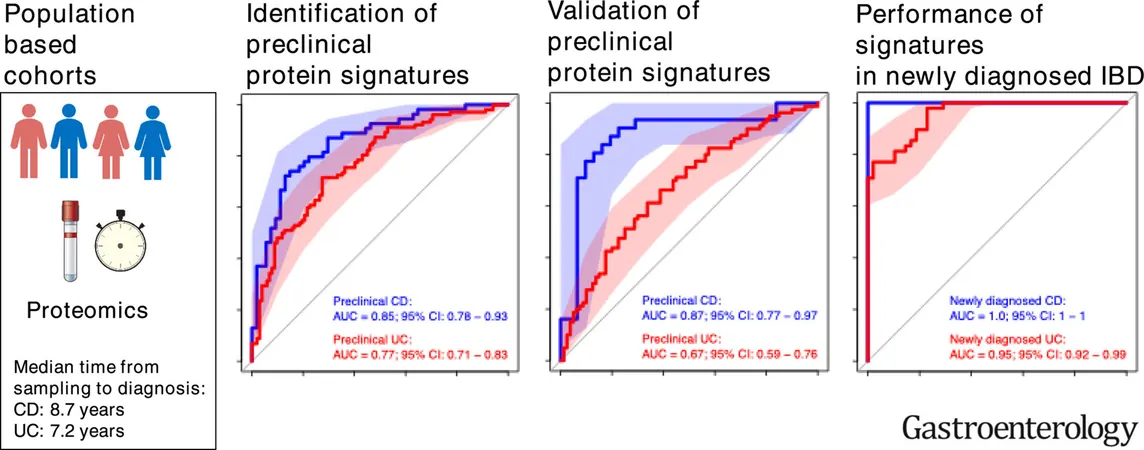
Revolutionary Study: Blood Tests Could Predict Inflammatory Bowel Disease 16 Years Before Symptoms!
2024-11-26
Author: Wei Ling
Revolutionary Study: Blood Tests Could Predict Inflammatory Bowel Disease 16 Years Before Symptoms!
A groundbreaking study from researchers at Örebro University has revealed that specific protein patterns in blood tests could allow for the prediction of inflammatory bowel disease (IBD) a staggering 16 years before symptoms appear. This pioneering discovery offers hope for early intervention and management of conditions such as Crohn's disease and ulcerative colitis, as documented in the prestigious journal Gastroenterology.
"Predicting and preventing these diseases at an early stage is a monumental leap forward," states Jonas Halfvarson, the lead researcher and a professor of gastroenterology at Örebro University. The study's findings could reshape the future of how we approach IBD, which affects millions worldwide.
In their ambitious research, scientists analyzed nearly 800 blood samples to identify distinct protein patterns that differentiate healthy individuals from those at risk of developing Crohn's disease or ulcerative colitis. Remarkably, they discovered that a specific combination of 29 proteins can forecast the onset of Crohn's disease with impressive accuracy, while ulcerative colitis showed more complex, albeit still detectable, protein changes.
Olle Grännö, a Ph.D. student involved in the study, highlighted that, “There is a connection between altered protein patterns and the future onset of ulcerative colitis, but it isn't as pronounced as it is for Crohn's disease.” This finding underscores the need for more extensive research into the nuances of protein changes associated with different forms of IBD.
Understanding the IBD Development Process
The study emphasizes how tracking protein shifts can provide insights into the development of IBD, with researchers able to observe these alterations up to 16 years before formal diagnosis. Halfvarson remarked, "Identifying these markers early allows for the potential of timely intervention, significantly improving the quality of life for those at risk for IBD."
Critical to this understanding are proteins related to intestinal barrier function and immune responses, which play a vital role in the disease's progression. "This research allows us to unveil the biological mechanisms behind IBD, pushing the boundaries of our comprehension," Grännö added.
Why Early Intervention is Crucial
One of the biggest challenges with IBD is that it can quietly inflict damage on the gastrointestinal tract for years, often going unnoticed until severe symptoms manifest. Halfvarson warns, "Despite the rise in available treatments, none can reverse existing damage. Thus, initiating treatment as early as possible drastically improves the patient's outlook and diminishes the risk of complications."
The implications of this study are immense, offering a glimpse into a future where early detection and intervention could become the norm for managing inflammatory bowel disease. If these findings are validated in larger clinical trials, we may be on the verge of significant advancements in the fight against IBD, potentially transforming the lives of countless individuals. Stay tuned as researchers continue to explore this promising development!



 Brasil (PT)
Brasil (PT)
 Canada (EN)
Canada (EN)
 Chile (ES)
Chile (ES)
 España (ES)
España (ES)
 France (FR)
France (FR)
 Hong Kong (EN)
Hong Kong (EN)
 Italia (IT)
Italia (IT)
 日本 (JA)
日本 (JA)
 Magyarország (HU)
Magyarország (HU)
 Norge (NO)
Norge (NO)
 Polska (PL)
Polska (PL)
 Schweiz (DE)
Schweiz (DE)
 Singapore (EN)
Singapore (EN)
 Sverige (SV)
Sverige (SV)
 Suomi (FI)
Suomi (FI)
 Türkiye (TR)
Türkiye (TR)